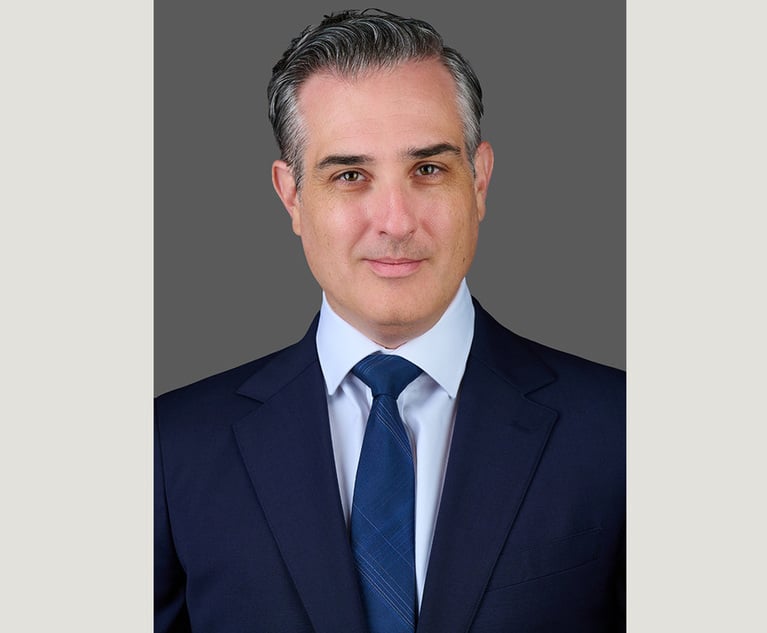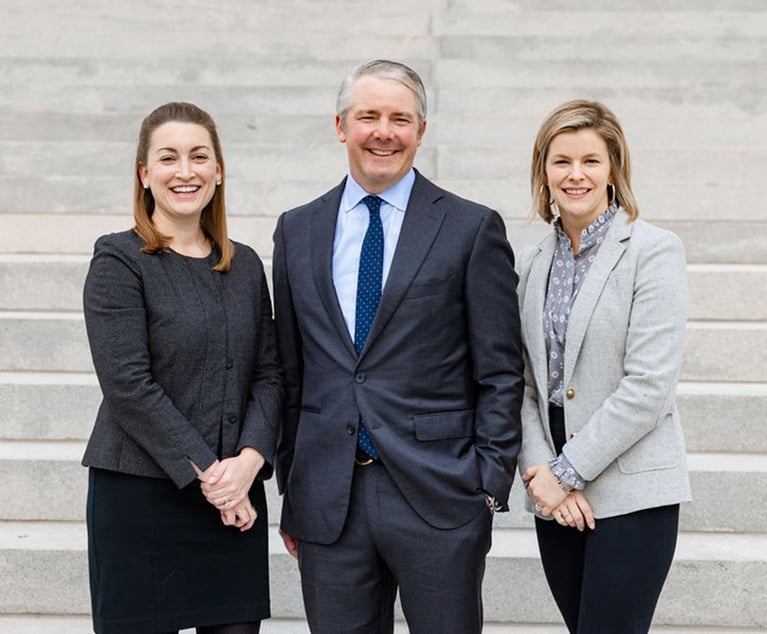New Trial Granted, $600K Injury Verdict Erased Over Lawyer's 'Improper' Remarks
A lawyer's courtroom remarks about two unrelated CSX Transportation workplace deaths and the company's manpower in a railroad injury lawsuit were prejudicial enough for the Pennsylvania Superior Court to grant a new trial and upend a nearly $600,000 judgment in favor of his client.
November 20, 2017 at 04:52 PM
3 minute read

A lawyer's courtroom remarks about two unrelated CSX Transportation workplace deaths and the company's manpower in a railroad injury lawsuit were prejudicial enough for the Pennsylvania Superior Court to grant a new trial and upend a nearly $600,000 judgment in favor of his client.
The court granted defendants American Premier Underwriters, Conrail and CSX's request for a new trial, finding that plaintiff Mike Buttaccio's lawyer violated a preclusion order prohibiting him from raising the subject of CSX's manpower and mentioning the two deaths.
Buttaccio's lawyer, Michael Lockard of David Lockard & Associates in Philadelphia, did not return a call seeking comment.
Robert Palumbos of Duane Morris, who represents the defendants, said, “We're pleased with the decision and are looking forward to the next steps at the trial court.”
Buttaccio, a railroad carman since 1973, sued the defendants for carpal tunnel injuries sustained from years of heavy work involving maneuvering in awkward positions, which he claims could have been avoided if the defendants minimized “exposures to these risk factors,” according to Superior Court Judge James J. Fitzgerald's opinion.
Fitzgerald was joined by Judges Paula Francisco Ott and Lillian Harris Ransom.
The jury found in Buttaccio's favor and awarded him $600,000, which the trial court molded to $597,000 based on the jury's finding that he was 0.5 percent comparatively negligent. The defendants subsequently appealed, claiming that Buttaccio's experts should not have been allowed to testify, but chiefly asking for a new trial based on Lockard's remarks.
“Appellee does not contest that his counsel's references to 'manpower' violated the trial court's pretrial order. Instead, appellee contends that they caused no prejudice,” Fitzgerald said. “We disagree. In the first place, appellee did not proffer any expert testimony that the railroads provided insufficient manpower, so appellee had no foundation to claim insufficient manpower.”
He continued, “By repeatedly injecting the manpower issue into the case, counsel drew attention to a theory that the jury never should have heard and invited the jury to decide the case on an improper basis. Although the trial court issued several curative instructions to disregard counsel's improper remarks, the sheer number of counsel's improper references prejudiced appellants; they were 'too numerous to be harmless.'”
Fitzgerald also noted that the trial court rebuked Lockard's mentioning of two CSX employees killed on the job as “'a shameless attempt to prejudice this jury'” but still did not grant a mistrial. The trial court also did not issue a curative instruction to the jury, the appeals panel added.
“The trial court compounded its error by failing to issue a curative instruction to the jury,” Fitzgerald said.
This content has been archived. It is available through our partners, LexisNexis® and Bloomberg Law.
To view this content, please continue to their sites.
Not a Lexis Subscriber?
Subscribe Now
Not a Bloomberg Law Subscriber?
Subscribe Now
NOT FOR REPRINT
© 2025 ALM Global, LLC, All Rights Reserved. Request academic re-use from www.copyright.com. All other uses, submit a request to [email protected]. For more information visit Asset & Logo Licensing.
You Might Like
View All

'Taking the Best' of Both Firms, Ballard Spahr and Lane Powell Officially Merge
6 minute read

Trending Stories
- 1New York Court of Appeals Blocks Trump Attempt to Stay Friday Sentencing
- 2'Self-Diagnosed Nickel Allergy' Fails to Find Success in Med-Mal Suit, 8th Circuit Rules
- 3Eversheds Sutherland Adds Hunton Andrews Energy Lawyer With Cross-Border Experience
- 4Balancing Judicial Authority: Understanding Sanctions, Severance, and Interferences
- 5Up in the Air: Boeing’s Deferred Prosecution Saga Continues
Who Got The Work
Michael G. Bongiorno, Andrew Scott Dulberg and Elizabeth E. Driscoll from Wilmer Cutler Pickering Hale and Dorr have stepped in to represent Symbotic Inc., an A.I.-enabled technology platform that focuses on increasing supply chain efficiency, and other defendants in a pending shareholder derivative lawsuit. The case, filed Oct. 2 in Massachusetts District Court by the Brown Law Firm on behalf of Stephen Austen, accuses certain officers and directors of misleading investors in regard to Symbotic's potential for margin growth by failing to disclose that the company was not equipped to timely deploy its systems or manage expenses through project delays. The case, assigned to U.S. District Judge Nathaniel M. Gorton, is 1:24-cv-12522, Austen v. Cohen et al.
Who Got The Work
Edmund Polubinski and Marie Killmond of Davis Polk & Wardwell have entered appearances for data platform software development company MongoDB and other defendants in a pending shareholder derivative lawsuit. The action, filed Oct. 7 in New York Southern District Court by the Brown Law Firm, accuses the company's directors and/or officers of falsely expressing confidence in the company’s restructuring of its sales incentive plan and downplaying the severity of decreases in its upfront commitments. The case is 1:24-cv-07594, Roy v. Ittycheria et al.
Who Got The Work
Amy O. Bruchs and Kurt F. Ellison of Michael Best & Friedrich have entered appearances for Epic Systems Corp. in a pending employment discrimination lawsuit. The suit was filed Sept. 7 in Wisconsin Western District Court by Levine Eisberner LLC and Siri & Glimstad on behalf of a project manager who claims that he was wrongfully terminated after applying for a religious exemption to the defendant's COVID-19 vaccine mandate. The case, assigned to U.S. Magistrate Judge Anita Marie Boor, is 3:24-cv-00630, Secker, Nathan v. Epic Systems Corporation.
Who Got The Work
David X. Sullivan, Thomas J. Finn and Gregory A. Hall from McCarter & English have entered appearances for Sunrun Installation Services in a pending civil rights lawsuit. The complaint was filed Sept. 4 in Connecticut District Court by attorney Robert M. Berke on behalf of former employee George Edward Steins, who was arrested and charged with employing an unregistered home improvement salesperson. The complaint alleges that had Sunrun informed the Connecticut Department of Consumer Protection that the plaintiff's employment had ended in 2017 and that he no longer held Sunrun's home improvement contractor license, he would not have been hit with charges, which were dismissed in May 2024. The case, assigned to U.S. District Judge Jeffrey A. Meyer, is 3:24-cv-01423, Steins v. Sunrun, Inc. et al.
Who Got The Work
Greenberg Traurig shareholder Joshua L. Raskin has entered an appearance for boohoo.com UK Ltd. in a pending patent infringement lawsuit. The suit, filed Sept. 3 in Texas Eastern District Court by Rozier Hardt McDonough on behalf of Alto Dynamics, asserts five patents related to an online shopping platform. The case, assigned to U.S. District Judge Rodney Gilstrap, is 2:24-cv-00719, Alto Dynamics, LLC v. boohoo.com UK Limited.
Featured Firms
Law Offices of Gary Martin Hays & Associates, P.C.
(470) 294-1674
Law Offices of Mark E. Salomone
(857) 444-6468
Smith & Hassler
(713) 739-1250





